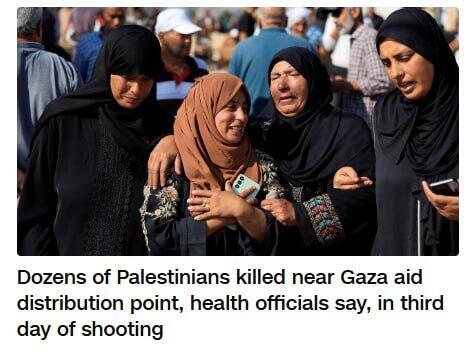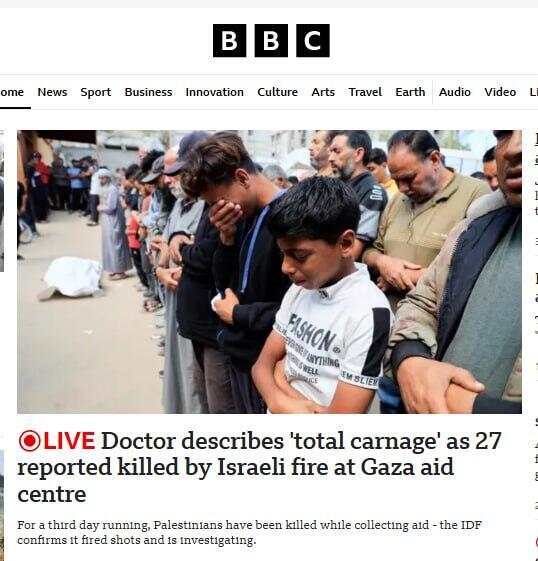The Gaza Humanitarian Foundation (GHF), which launched a high-profile food distribution initiative in the Strip and was initially met with some enthusiasm among the local population, has encountered major obstacles during its first week of operation. Alongside reports of deadly shooting incidents—allegedly involving IDF fire on civilians collecting aid—two senior figures from the foundation have resigned, and leading humanitarian groups, including the UN, have refused to participate.
Footage from when the shooting occurred
Sources familiar with the initiative told the Washington Post that GHF is now struggling to function without its core team, particularly following the withdrawal of Boston Consulting Group (BCG), the global consulting firm that had served as a critical operational partner.
On Friday, BCG announced it was terminating its contract with GHF and withdrawing its personnel from Tel Aviv. One senior partner involved in the project was placed on leave, pending an internal review. According to the Washington Post, BCG had effectively been the engine of the project—designing the logistics model, determining operating costs, and coordinating the contractors who built four distribution centers in southern Gaza. Although BCG insisted it had offered its services pro bono, other sources claimed the firm submitted invoices exceeding $1 million per month.
Despite these setbacks, GHF maintains that over 7 million meals were distributed during the first week. “This proves our model works and offers a viable emergency channel to deliver lifesaving aid to civilians in Gaza,” said the company’s interim CEO. The operational model—developed with private sector input and Israeli government coordination—was designed to minimize Hamas interference. To that end, GHF contracted armed American personnel to escort convoys and secure distribution centers.
Three of the four centers are currently operational in southern Gaza, though they open only for limited hours each day, until supplies run out. While no violence has been reported inside the distribution compounds, medical sources in Gaza reported dozens of casualties from gunfire outside. IDF officials stated that soldiers fired into the air to disperse the crowds and denied shooting directly at civilians. The military further claimed the reported casualties were part of a “Hamas propaganda effort” and released footage purporting to show armed terrorists firing into the crowd.
Major international aid organizations have distanced themselves from the initiative, citing concerns over humanitarian neutrality and its alignment with Israeli military interests. Several international donors also expressed hesitation, and internal Israeli defense ministry assessments reportedly warned that overcrowding and chaos at distribution points could lead to violent incidents.
Cindy McCain, head of the UN’s World Food Program (WFP) and widow of former GOP presidential candidate John McCain, called the situation a “tragedy.” In an interview with ABC, she said: “What we need now is an immediate ceasefire, safe and unrestricted access, and the full opening of all crossings—to feed people and avoid catastrophe.”
Though Israel has allowed UN convoys into Gaza over the past week, the WFP reported that some trucks were looted by desperate civilians before reaching designated distribution zones. One humanitarian official who declined to participate in the GHF initiative commented: “Like it or not, Israel is setting the terms on the ground. Neutral humanitarian aid is virtually impossible under these conditions.”
Get the Ynetnews app on your smartphone: Google Play: https://bit.ly/4eJ37pE | Apple App Store: https://bit.ly/3ZL7iNv
In the wake of the deadly Rafah incident—still unaddressed by the IDF beyond a brief early morning statement—GHF announced plans to open a fifth distribution center in northern Gaza on Wednesday. The expansion aims to improve access for residents in the north, with detailed instructions on operating hours and pickup logistics to follow. GHF also issued a warning in Arabic advising civilians to avoid the area south of Netzarim due to ongoing military activity.
According to company figures, the Tel Sultan distribution center (SDS1) dispatched 21 food trucks on Tuesday morning, delivering 20,160 boxes and an estimated 1.15 million meals. To date, GHF reports it has distributed more than 107,000 food packages—equivalent to over 7 million meals—across the Gaza Strip.







